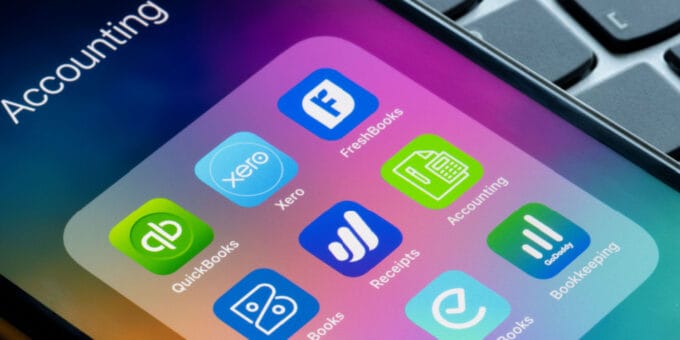When you’re running a company, time is of the essence. But with so much to think about, it’s often easy to be anchored down by tasks that can distract you from the heart of the business.
These tasks can consume energy reserves and waste valuable resources, which can ultimately stunt the growth of a business. Fortunately, there is a solution; accounting software can provide a whole host of benefits that can save you precious time as well as money.
In this blog, we’ll explore the advantages accounting software can offer a business, as well as take a look at some of the highly recommended accounting solutions out there.
Let’s get started.
Key Takeaways
- Automating accounting tasks significantly reduces time spent on manual processes, allowing businesses to focus on core operations.
- Cloud-based accounting software enhances collaboration by providing real-time access to financial data for teams and stakeholders.
- Accurate financial reporting from accounting software empowers businesses to make informed, data-driven decisions for growth.
What is accounting software?
Accounting software is a computer-based program designed to assist businesses and individuals in managing their financial data, tracking their income and expenses, and producing financial reports.
The software automates a number of accounting tasks such as recording financial transactions, calculating taxes, and generating invoices, and can be integrated with existing payment processors, making the accounting process streamlined and accurate.
It can be used by businesses of all shapes and sizes, from sole traders right up to large corporations, and can be customised to meet the specific needs of each business.
Types of accounting software
Accounting software can be cloud-based (online), allowing you to log in and retrieve a financial overview from anywhere at any time, or it can be downloaded as a program and installed on a device such as your computer desktop.
With cloud-based accounting software, your data is stored securely and accessible on the go from any device, anywhere with an internet connection.
There’s no need to download anything and you don’t need to worry about undertaking manual updates or having additional storage space. With desktop accounting, you will need to back up your data and keep on top of regular updates to ensure your software is running smoothly at all times.
The benefits of accounting software
1. Automate your processes
Accounting software can automate multiple routine tasks that would otherwise be heavily time-consuming when done manually.
Things such as importing data, bookkeeping, payroll, financial reports, invoicing, and payment reminders can all be effectively taken care of through automation; making laborious accounting tasks much easier and quicker to process.
2. Get more organised
When juggling so many different tasks at once, it’s easy to lose track of or mislay things like receipts or invoices.
But digitalising your accounting processes and storing data in one safe place through this software allows important admin to be kept together securely, so that it can be accessed at a later date and reviewed, reprinted and resent if ever needed.
Not only this, but the software enables you to set up reminders that can prove critical to helping you stay organised and on top of things, without the fear of forgetting an impending deadline.
3. Minimise errors
We all make mistakes. But a financial error can be a costly and stress-inducing experience.
When you combine working under pressure with number crunching and complex calculations, it’s easy to become more prone to errors.
Some of the most common accounting mistakes include:
- Data entry errors: for example, when a figure is inputted incorrectly, or transactions are recorded in the wrong account
- Duplication: an entry is credited or debited twice
- Omission: The transaction happens but an entry is omitted
- Failure to reconcile your books: leading to inaccurate financial statements and tax filings
However, accounting software can completely bypass many of these mistakes, leading to more accurate and organised books.
4. Gain a clearer understanding of your financial health
Understanding how your business is performing is vital to its growth, but this can be difficult to gauge without the right metrics in place. Accounting software can provide you with an accurate snapshot of financials and supply deeper insights into your business’ performance, allowing you to confidently make data-driven decisions.
Being able to access this information at any time can help quickly identify key areas for development.
5. Generate in-depth reports
On the subject of gaining clearer insights into your financial health, accounting software also enables you to easily create and pull reports on your finances.
Whether it be accounts receivable, accounts payable, or account trial balances – there’s a report for every area of accounting. Having this information condensed into a report is particularly useful for keeping a close eye on your cash flow and receiving regular insight into any emerging patterns that could indicate opportunities integral to your profits.
It is also a helpful asset to have to hand when communicating financials to other members of your team or company stakeholders.
6. Digitalise and streamline your invoicing
Creating invoices can be another time-consuming task. As previously mentioned, paper invoices and receipts can be easy to misplace and lose track of.
Accounting software allows you to not only draft up your invoices in a professional and customisable template, but also schedule and automate them. This can be hugely time-saving when sending out high volumes or requesting regular payments from your clients.
Not to mention that it removes the associated costs and admin of having to physically post them out via mail. This often proves not only more manageable for you and your team, but also for the client receiving the invoice.
7. Keep on top of tax compliance and returns
Tax season can be one of the most stressful times of the year for a business owner. But accounting software can help significantly lighten the burden when it comes to making tax returns.
Thanks to a combination of automated features and in-built tools, the process of tax preparation is much more straightforward. For example:
- Automated record-keeping: making it easier to track income, expenses, and other financial transactions important to forming tax returns.
- Tax-specific features: such as a tax calculator and planner, helping businesses estimate their tax liabilities and prepare accordingly.
- Automated tax filing: electronic tax returns, making the process faster and more convenient.
- Compliance with tax regulations: more accurate and reliable financial records, plus the ability to set important reminders, can help businesses avoid late penalties and fines associated with non-compliance.
8. Keep data secure
Cloud-based accounting software will usually follow GDPR guidelines, as well as incorporate data encryption and regular automatic back-ups, ensuring that your data is never lost. This gives you peace of mind that your data is completely secure at all times, and no matter what technical glitches you may experience, your data can never be erased.
This proves much more reliable than spreadsheets which can be prone to crashing, and desktop systems which can sometimes be slow to update.
9. Reduce your costs
Minimising the need for manual labour not only frees up any requirement for additional staff, but it also allows you or your existing team to focus on more valuable areas of the business that could otherwise be neglected.
Having real-time insight into your finances can help you more quickly identify potential costly mistakes before they arise, as well as spot improvements in terms of productivity and efficiency – all of which can help boost profits and reduce unnecessary costs.
10. Facilitate collaboration
With more of us working from home, it’s become increasingly important to work more collaboratively. This is much easier to achieve with software than it is via a spreadsheet, for example.
Your accountant or employees can view real-time data in one place, Plus, you can easily upload your documents, send invoices, import bank transactions, and share data securely. As mentioned before, you can pull interesting insights and formulate reports that can help demonstrate business performance to the rest of your team more clearly.
Choosing an accounting software
When it comes to choosing the accounting software that’s right for your company, you should consider aspects such as:
- Your budget: a good place to start is to consider how much you’d ideally like to spend. Do you want inexpensive accounting software that takes care of the more basic accounting tasks? Or can you stretch your budget to encompass software with more advanced features?
- Features: what would you predominantly like to achieve from your accounting software? For example, which accounting reports would you like it to generate? Will you be using it to create invoices for your clients? Do you need it to conduct payroll? Create a checklist of the must-have features that you can refer to and draw comparisons from during your search.
- Usability: would you prefer online, cloud-based accounting software? Or one that you can install onto your desktop? Consider whether you need to be able to access it from a mobile device, or perhaps in offline mode. And how many people will need to access the software?
The software you choose will ultimately depend on your specific business requirements. Determining the answers to these questions will help make your decision a much easier one.
And while there is no one size fits all, here are some of the most popular accounting software options:
Xero is a popular accounting software that’s used by businesses of all sizes. It offers its users a wide range of useful features such as invoicing, expense tracking, payroll management, and financial reporting, with an emphasis on making things more streamlined via automation.
Another popular choice, particularly for small and medium-sized businesses, QuickBooks provides some similar features to Xero, such as invoicing, expense tracking, payroll management, and financial reporting.
FreshBooks is a cloud-based accounting software solution that is popular among sole traders and small business owners. It offers features such as invoicing, time tracking, expense tracking, and financial reporting, and is known for its user-friendly interface.
Another online solution, Zoho Books is particularly suited to VAT-registered companies. It helps you file your VAT returns directly to HMRC, automates business workflows, and facilitates the ability to work collectively across departments.
Finally, Sage is another widely-used accounting software. Again, it has a range of features to choose from, like invoicing and inventory management. Additionally, it offers different versions of its software to cater to specific industries, such as retail, construction, and manufacturing.
Wrapping up
So there you have it, the benefits of using accounting software.
We hope you’ve found this blog useful, and that it’s helped clarify the various advantages accounting software can offer you.
If you have any questions, please leave a comment below and we will come back to you.
Please note that the information provided in this article is for general informational purposes only and does not constitute legal, tax, or professional advice. While our aim is that the content is accurate and up to date, it should not be relied upon as a substitute for tailored advice from qualified professionals. We strongly recommend that you seek independent legal and tax advice specific to your circumstances before acting on any information contained in this article. We accept no responsibility or liability for any loss or damage that may result from your reliance on the information provided in this article. Use of the information contained in this article is entirely at your own risk.










Join The Discussion
Comments (2)
Thanks for the article! Learning the benefits of accounting software will be helpful for my own tax planning UK business.
Thank you for your kind comment, David. We’re glad to hear you found the article helpful.
Kind regards,
The Rapid Formations Team